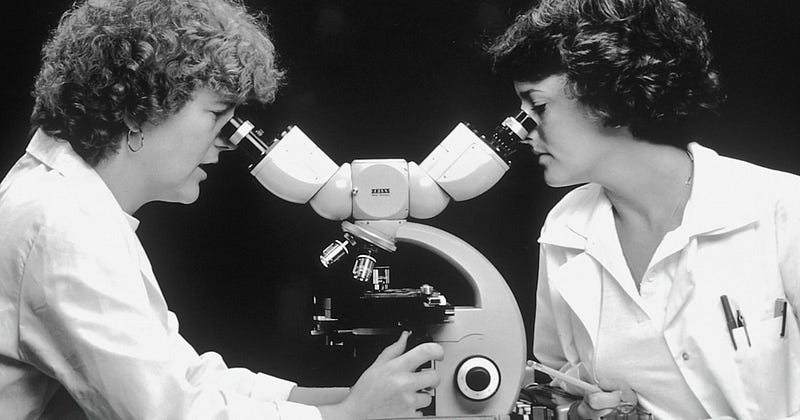# Identity Beyond Academia: Embracing Your Scientific Self
Written on
Chapter 1: The Scientist's Dilemma
When I transitioned from academia to a tech role nearly a decade ago, I confronted a significant internal conflict—one that many PhDs experience during such a shift: an identity crisis. My journey was unique, yet the emotional turmoil echoed the experiences of other PhDs contemplating a similar move. The core question that haunted me was:
“Am I still a scientist?”
This deeply personal struggle can endure for quite some time, as it fundamentally challenges your self-perception. Earning a PhD often intertwines your identity with that of a scientist. After dedicating five or more years to obtain that degree, it’s common to associate your scientific identity with the academic environment you occupied. Departing from that setting can evoke uncertainty.
While some of these feelings are self-imposed, they are largely influenced by the prevailing academic culture. Scholars tend to live in a bubble, feeling that their vocation is a divine calling, as if professors are innately destined for their roles. There’s a pervasive notion that only research conducted within a university and published in high-impact journals constitutes “real science.”

Understanding the Nature of Science
Before I dismantle this institutional myth, let’s return to the crucial topic of your identity crisis. This is a deeply personal battle, but I aim to provide insights that may assist you. Let’s deconstruct what it truly means to be a scientist.
Being a scientist encompasses three primary components, which vary in significance:
- Job Title
- Skills and Activities
- Mindset
To begin, let’s address the title. The reality is that job titles often hold little weight. Numerous roles across various fields include the term “scientist”—think research scientist, data scientist, food scientist, etc. Notably, “Professor” is not one of them. Titles merely offer a quick reference to your role; you can still identify as a scientist even if it doesn’t appear on your business card. There are undoubtedly individuals labeled as scientists who have never published a paper or conducted an experiment.
Next, consider the tasks you perform regularly. Regardless of your employer, do you ask critical questions? Are you gathering and synthesizing data into meaningful insights? Are you experimenting to discern truth from speculation? Do you mentor those who engage in these practices? That sounds very much like science to me.
Finally, let’s discuss the most crucial aspect of your identity: Mindset. How you perceive the world matters immensely. Are you driven by curiosity? Do you question overly simplistic answers and strive to uncover deeper truths? Do you derive joy from sharing newfound knowledge? Even if you take your PhD and work in a non-scientific field, maintaining this mindset allows you to identify as a scientist, as your thinking and values align with those of scientific inquiry.
Even if your job doesn’t involve the scientific method directly, you can still apply a scientific mindset in your work. There’s no rule dictating that you must fit into a single category. Life is multifaceted, and your identity can encompass various roles. It’s akin to training for five years as a dancer and later working as an accountant. Does your role as an accountant negate your identity as a dancer, even if you no longer perform?
Your biography would likely reflect both “dancer” and “accountant,” along with other significant roles such as sibling, parent, or mentor.

Debunking the Academic Monopoly
Having shared heartfelt insights, you may choose to stop here if you find value in what I’ve said. The following section aims to challenge the perception that academia possesses exclusive rights to science.
Consider the various groups that fall under or adjacent to the term “academia.” It typically refers to institutions such as:
- Educational establishments like universities, which operate as businesses profiting from sports.
- For-profit journals that earn revenue from professors without compensating them.
- Government and grant agencies that create the rules governing science.
This structure was designed to organize and regulate scientific activities. Humans determine which degrees (like PhDs) exist, the skills to be taught, evaluation methods, and even the formatting of research.
Academia is a system intended to standardize the production of science and its practitioners. It aspires to, but does not possess, a monopoly on science. The first PhD in the U.S. was awarded in 1861—a relatively recent development.
Consider renowned figures like Michael Faraday, Charles Darwin, James Joule, Galileo Galilei, Isaac Newton, and Leonardo Da Vinci. They contributed more to science than I ever will, often without holding a PhD. If their legacies endure as scientific icons centuries after their passing, it highlights the absurdity of attributing ownership of scientific identity solely to a community from which these pioneers were absent.
If you found this discussion enlightening, feel free to join my mailing list! I don’t send frequent updates, but you might appreciate the messages when they do arrive.